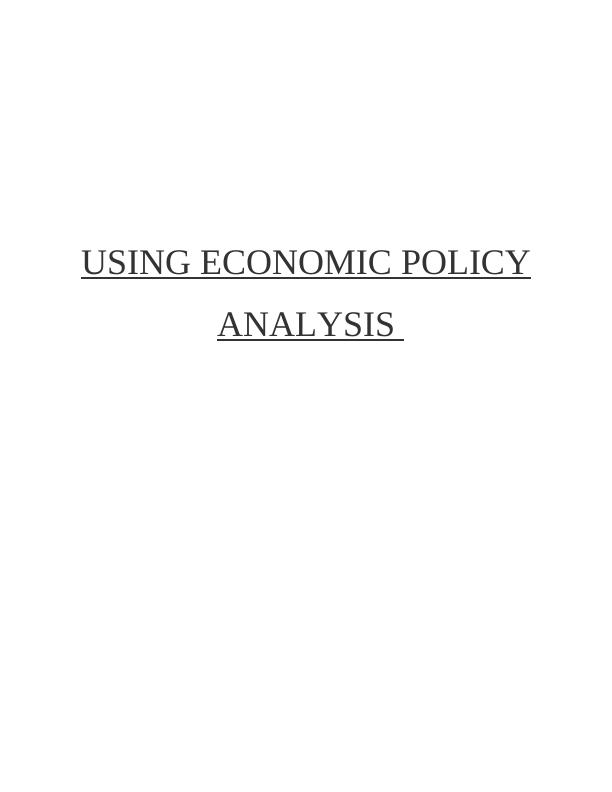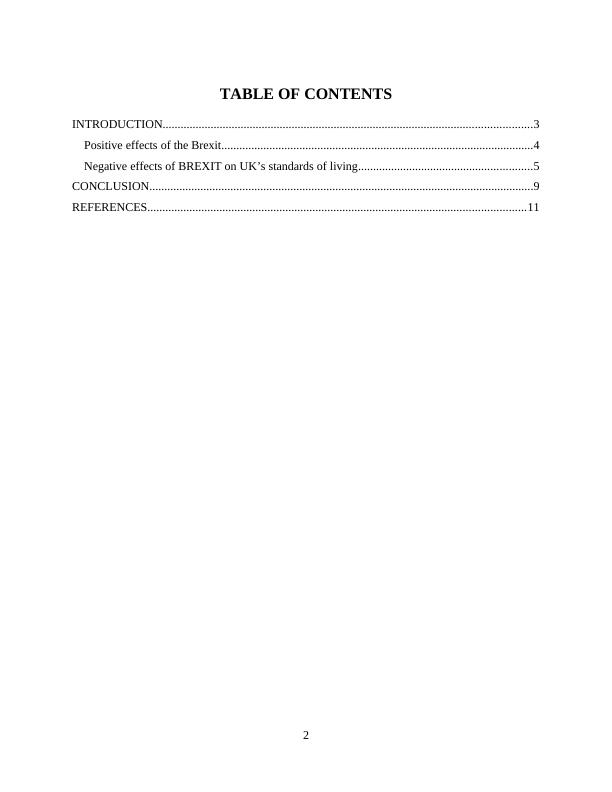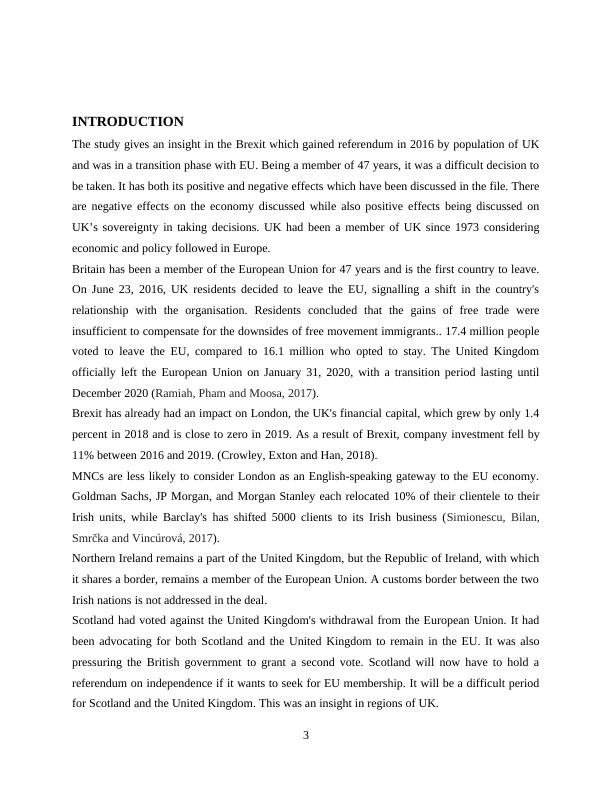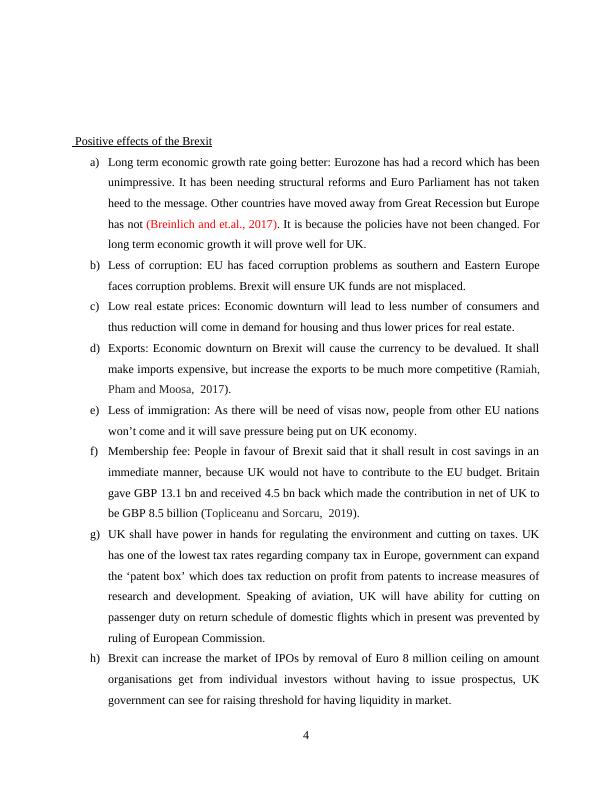Effects of Brexit on UK's Standards of Living
Added on 2022-11-28
11 Pages3838 Words257 Views
USING ECONOMIC POLICY
ANALYSIS
ANALYSIS

TABLE OF CONTENTS
INTRODUCTION...........................................................................................................................3
Positive effects of the Brexit........................................................................................................4
Negative effects of BREXIT on UK’s standards of living..........................................................5
CONCLUSION................................................................................................................................9
REFERENCES..............................................................................................................................11
2
INTRODUCTION...........................................................................................................................3
Positive effects of the Brexit........................................................................................................4
Negative effects of BREXIT on UK’s standards of living..........................................................5
CONCLUSION................................................................................................................................9
REFERENCES..............................................................................................................................11
2

INTRODUCTION
The study gives an insight in the Brexit which gained referendum in 2016 by population of UK
and was in a transition phase with EU. Being a member of 47 years, it was a difficult decision to
be taken. It has both its positive and negative effects which have been discussed in the file. There
are negative effects on the economy discussed while also positive effects being discussed on
UK’s sovereignty in taking decisions. UK had been a member of UK since 1973 considering
economic and policy followed in Europe.
Britain has been a member of the European Union for 47 years and is the first country to leave.
On June 23, 2016, UK residents decided to leave the EU, signalling a shift in the country's
relationship with the organisation. Residents concluded that the gains of free trade were
insufficient to compensate for the downsides of free movement immigrants.. 17.4 million people
voted to leave the EU, compared to 16.1 million who opted to stay. The United Kingdom
officially left the European Union on January 31, 2020, with a transition period lasting until
December 2020 (Ramiah, Pham and Moosa, 2017).
Brexit has already had an impact on London, the UK's financial capital, which grew by only 1.4
percent in 2018 and is close to zero in 2019. As a result of Brexit, company investment fell by
11% between 2016 and 2019. (Crowley, Exton and Han, 2018).
MNCs are less likely to consider London as an English-speaking gateway to the EU economy.
Goldman Sachs, JP Morgan, and Morgan Stanley each relocated 10% of their clientele to their
Irish units, while Barclay's has shifted 5000 clients to its Irish business (Simionescu, Bilan,
Smrčka and Vincúrová, 2017).
Northern Ireland remains a part of the United Kingdom, but the Republic of Ireland, with which
it shares a border, remains a member of the European Union. A customs border between the two
Irish nations is not addressed in the deal.
Scotland had voted against the United Kingdom's withdrawal from the European Union. It had
been advocating for both Scotland and the United Kingdom to remain in the EU. It was also
pressuring the British government to grant a second vote. Scotland will now have to hold a
referendum on independence if it wants to seek for EU membership. It will be a difficult period
for Scotland and the United Kingdom. This was an insight in regions of UK.
3
The study gives an insight in the Brexit which gained referendum in 2016 by population of UK
and was in a transition phase with EU. Being a member of 47 years, it was a difficult decision to
be taken. It has both its positive and negative effects which have been discussed in the file. There
are negative effects on the economy discussed while also positive effects being discussed on
UK’s sovereignty in taking decisions. UK had been a member of UK since 1973 considering
economic and policy followed in Europe.
Britain has been a member of the European Union for 47 years and is the first country to leave.
On June 23, 2016, UK residents decided to leave the EU, signalling a shift in the country's
relationship with the organisation. Residents concluded that the gains of free trade were
insufficient to compensate for the downsides of free movement immigrants.. 17.4 million people
voted to leave the EU, compared to 16.1 million who opted to stay. The United Kingdom
officially left the European Union on January 31, 2020, with a transition period lasting until
December 2020 (Ramiah, Pham and Moosa, 2017).
Brexit has already had an impact on London, the UK's financial capital, which grew by only 1.4
percent in 2018 and is close to zero in 2019. As a result of Brexit, company investment fell by
11% between 2016 and 2019. (Crowley, Exton and Han, 2018).
MNCs are less likely to consider London as an English-speaking gateway to the EU economy.
Goldman Sachs, JP Morgan, and Morgan Stanley each relocated 10% of their clientele to their
Irish units, while Barclay's has shifted 5000 clients to its Irish business (Simionescu, Bilan,
Smrčka and Vincúrová, 2017).
Northern Ireland remains a part of the United Kingdom, but the Republic of Ireland, with which
it shares a border, remains a member of the European Union. A customs border between the two
Irish nations is not addressed in the deal.
Scotland had voted against the United Kingdom's withdrawal from the European Union. It had
been advocating for both Scotland and the United Kingdom to remain in the EU. It was also
pressuring the British government to grant a second vote. Scotland will now have to hold a
referendum on independence if it wants to seek for EU membership. It will be a difficult period
for Scotland and the United Kingdom. This was an insight in regions of UK.
3

Positive effects of the Brexit
a) Long term economic growth rate going better: Eurozone has had a record which has been
unimpressive. It has been needing structural reforms and Euro Parliament has not taken
heed to the message. Other countries have moved away from Great Recession but Europe
has not (Breinlich and et.al., 2017). It is because the policies have not been changed. For
long term economic growth it will prove well for UK.
b) Less of corruption: EU has faced corruption problems as southern and Eastern Europe
faces corruption problems. Brexit will ensure UK funds are not misplaced.
c) Low real estate prices: Economic downturn will lead to less number of consumers and
thus reduction will come in demand for housing and thus lower prices for real estate.
d) Exports: Economic downturn on Brexit will cause the currency to be devalued. It shall
make imports expensive, but increase the exports to be much more competitive (Ramiah,
Pham and Moosa, 2017).
e) Less of immigration: As there will be need of visas now, people from other EU nations
won’t come and it will save pressure being put on UK economy.
f) Membership fee: People in favour of Brexit said that it shall result in cost savings in an
immediate manner, because UK would not have to contribute to the EU budget. Britain
gave GBP 13.1 bn and received 4.5 bn back which made the contribution in net of UK to
be GBP 8.5 billion (Topliceanu and Sorcaru, 2019).
g) UK shall have power in hands for regulating the environment and cutting on taxes. UK
has one of the lowest tax rates regarding company tax in Europe, government can expand
the ‘patent box’ which does tax reduction on profit from patents to increase measures of
research and development. Speaking of aviation, UK will have ability for cutting on
passenger duty on return schedule of domestic flights which in present was prevented by
ruling of European Commission.
h) Brexit can increase the market of IPOs by removal of Euro 8 million ceiling on amount
organisations get from individual investors without having to issue prospectus, UK
government can see for raising threshold for having liquidity in market.
4
a) Long term economic growth rate going better: Eurozone has had a record which has been
unimpressive. It has been needing structural reforms and Euro Parliament has not taken
heed to the message. Other countries have moved away from Great Recession but Europe
has not (Breinlich and et.al., 2017). It is because the policies have not been changed. For
long term economic growth it will prove well for UK.
b) Less of corruption: EU has faced corruption problems as southern and Eastern Europe
faces corruption problems. Brexit will ensure UK funds are not misplaced.
c) Low real estate prices: Economic downturn will lead to less number of consumers and
thus reduction will come in demand for housing and thus lower prices for real estate.
d) Exports: Economic downturn on Brexit will cause the currency to be devalued. It shall
make imports expensive, but increase the exports to be much more competitive (Ramiah,
Pham and Moosa, 2017).
e) Less of immigration: As there will be need of visas now, people from other EU nations
won’t come and it will save pressure being put on UK economy.
f) Membership fee: People in favour of Brexit said that it shall result in cost savings in an
immediate manner, because UK would not have to contribute to the EU budget. Britain
gave GBP 13.1 bn and received 4.5 bn back which made the contribution in net of UK to
be GBP 8.5 billion (Topliceanu and Sorcaru, 2019).
g) UK shall have power in hands for regulating the environment and cutting on taxes. UK
has one of the lowest tax rates regarding company tax in Europe, government can expand
the ‘patent box’ which does tax reduction on profit from patents to increase measures of
research and development. Speaking of aviation, UK will have ability for cutting on
passenger duty on return schedule of domestic flights which in present was prevented by
ruling of European Commission.
h) Brexit can increase the market of IPOs by removal of Euro 8 million ceiling on amount
organisations get from individual investors without having to issue prospectus, UK
government can see for raising threshold for having liquidity in market.
4

End of preview
Want to access all the pages? Upload your documents or become a member.
Related Documents
Impact of UK Brexit from EU on Economylg...
|19
|1945
|75
Impact of Brexit in the UK Assignmentlg...
|16
|3530
|34
The Impact of BREXIT on UK Retail Sectorlg...
|12
|3842
|44
Civil Law UK and EU Issues 2022lg...
|9
|1995
|14
History of Brexitlg...
|10
|868
|423
Effects of Brexit on Revenue Management in Interstate hotels grouplg...
|19
|4832
|15
